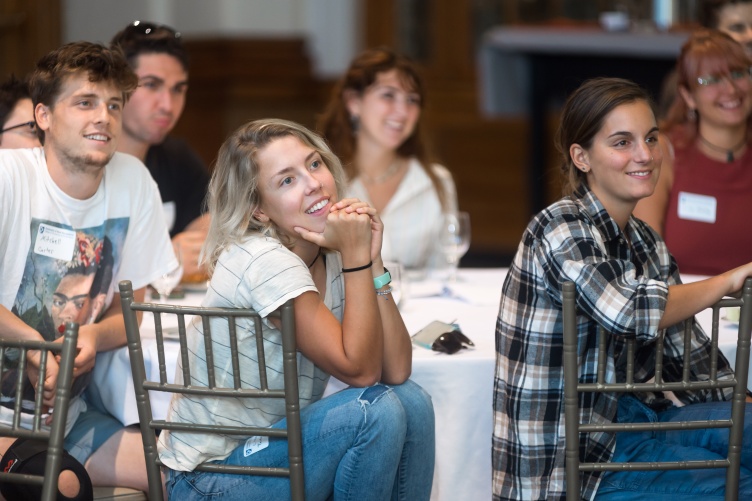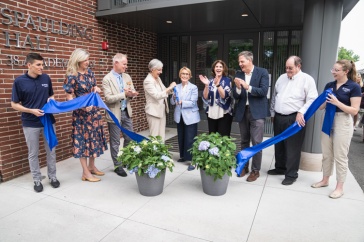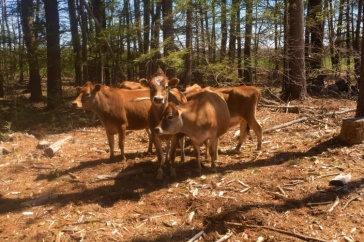
EcoQuest alumni listen to the speakers during the 20th anniversary celebration in the Huddleston Ballroom on Aug. 29. Photo credit: Jason McKibben
The UNH College of Life Sciences and Agriculture (COLSA) is celebrating 20 years of the New Zealand study-abroad program EcoQuest.
The program, which combines cultural immersion, rigorous coursework and directed hands-on field research that makes important contributions to ecological conservation, is made possible by a long-standing partnership with the EcoQuest Education Foundation Te Rarangahau Taiao in New Zealand and COLSA.
Since 1999, 1,006 college students have gone to New Zealand as part of the program — 544 from UNH and the remainder from more than 90 colleges and universities from around the country.
The idea for EcoQuest originated with Bill Brownell, a marine biologist who graduated from UNH in 1967 and was living in New Zealand, and two of his associates, Tony Cummings and Paul Robertson. In 1996, Brownell sought a stateside partner for a new study-abroad program and approached UNH first.
“The timing in the mid-1990s was perfect: a rapidly evolving realization that students learn most effectively through guided applications of what they have learned in the classroom and through life experience,” he says. “It’s extremely gratifying to have been part of such a successful, collaborative modern educational initiative now in its 20th year of operation, which still goes, unfalteringly, from strength to strength.”
“There is definitely something in the water. The students go to New Zealand and something happens that’s incredibly transformative.”
From the beginning, the aim was to create a learning community based on New Zealand’s unique natural, political and cultural landscapes and deliver an experience for students that gives them a substantive role in the country’s ecological research, engages them in authentic work with local groups, encourages development of their hearts and spirits and fosters a global commitment to the environment.
In late August, COLSA hosted a reception in Huddleston Hall ballroom to celebrate the 20th anniversary. The event began with a steady stream of warm hugs and joyous exclamations shared among more than 30 EcoQuest alumni and Ria Brejaart, the program’s academic director and EcoQuest Education Foundation co-founder, who traveled from New Zealand for the celebration, as well as Kim Babbitt, COLSA’s associate dean of academic affairs and the academic program coordinator for EcoQuest, and Donna Dowal, EcoQuest’s director of admissions. Brejaart calls this connection “whanau,” a Māori word that describes the deep and far-reaching inclusivity and acceptance that produces an indelible bond among everyone associated with the program.
“We encourage our students to include others on their journeys and celebrate diversity,” says Brejaart. “They dig deep, they find resources within themselves, and what they achieve is amazing.”

Those in attendance, including UNH President James Dean, senior vice provost P.T. Vasudevan, and Kerryellen Vroman, associate vice provost for international relations, along with several faculty and staff from COLSA and across campus, heard opening remarks from Babbitt, followed by Wayne Jones, provost and vice president of academic affairs, Mark Ducey, professor and chair of the department of natural resources and the environment, Jon Wraith, dean of COLSA, and Chris Meaney ’00, who was part of the first cohort of students to participate in EcoQuest in 1999. All shared their deep appreciation for the impact the program has had and continues to have on students’ lives.
Everyone was then treated to a live video greeting from the EcoQuest staff in New Zealand, with remarks led by EcoQuest director Jono Clark, and a presentation by Brejaart that included an overview of the program’s ecological conservation and biodiversity projects in New Zealand and their impacts.
It is a point of pride, says Brejaart, that for two decades the program has stayed true to its original vision and mission, even when it’s meant passing on opportunities to expand enrollment.
“This partnership is still one of a kind,” she says. “We teach from our perspectives and depend on the enthusiasm and joy of everyone involved. We could not do what we do on a larger scale. So we’ve stayed small and built trust and a good reputation.”
“It’s one of the most rewarding things I do here,” Babbitt says of her role administering the program. “I’m proud of the impact EcoQuest has on the lives of so many students. There is something about how the experience energizes students when they come back to campus. We have students completely change their path in life after going on the program. Many of our students have gone on to do really incredible things.”
As the evening came to close, the EcoQuest alums surprised Brejaart by singing a traditional Māori song called a waiata that is commonly used to mark special occasions. All EcoQuest students learn a waiata when they arrive in New Zealand. Standing together in the front of the room, beaming proudly at Brejaart, the self-possession and maturity that many have said are characteristic of EcoQuest alums was on full display.
“There is definitely something in the water. The students go to New Zealand and something happens that’s incredibly transformative,” says Dowal. “It’s that sense of belonging and a sense of place that these students experience and that is transforming. You see it in how they live their lives after they return.”
-
Written By:
Sarah Schaier | College of Life Sciences and Agriculture
















































